
Missamma is a 1955 Indian Telugu-language romantic comedy film directed by L. V. Prasad. It was produced by Nagi Reddi and Chakrapani on Vijaya Productions banner. The film stars N. T. Rama Rao, Savitri, Akkineni Nageswara Rao and Jamuna. The script was adapted by Chakrapani from Rabindranath Maitra's Bengali play Manmoyee Girls' School. It revolves around two unemployed people — M. T. Rao and Mary — who pose as a married couple to obtain employment in a high school founded by Gopalam, a zamindar. As Rao and Mary fall in love, Gopalam's nephew A. K. Raju learns that Mary is Gopalam's missing elder daughter Mahalakshmi; she is unaware of her true identity.
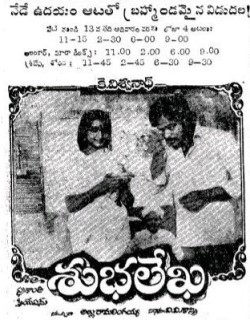
Subhalekha is a 1982 Telugu-language comedy-drama film written and directed by K. Viswanath. Produced by Allu Aravind and V. V. Sastry under Prasanthi Creations, the film stars Chiranjeevi and Sumalata, with music composed by K. V. Mahadevan. The film addresses the social issue of dowry and emphasizes the dignity of labour, delivering a strong message against the dowry system.

Bommireddi Narasimha Reddi, professionally known as B. N. Reddi, was an Indian film director, producer, and screenwriter. He was an early figure in the Telugu cinema. Many of his earlier films like Vande Mataram (1939), Devatha (1941) had V. Nagayya as the lead. His Malliswari (1951) starring N. T. Rama Rao and Bhanumathi is considered a timeless Indian film classic. Reddi was the first film personality to receive the Dadasaheb Phalke Award from South India the highest honorary award of Indian cinema. He was awarded India's third highest civilian honour the Padmabhushan, and the Doctor of Letters.

Bhakta Potana is a 1943 Telugu-language biographical film directed by K. V. Reddy in his directorial debut. Based on the life of poet-saint Potana who translated Bhagavatham into Telugu language, the film was scripted by Samudrala Sr. The film had celebrated Jubilee runs all over the South India including Mysore state and Kerala. It was remade in 1966, starring V. Nagayya as Potana.
Arkadu Parthasarathy Komala, commonly known as A. P. Komala, was an Indian playback singer. She has sung songs in Tamil, Malayalam, Telugu and Kannada languages.
K. Jamuna Rani is an Indian playback singer who has sung over 6,000 songs in Telugu, Sinhalese, Tamil, Kannada and Malayalam languages.
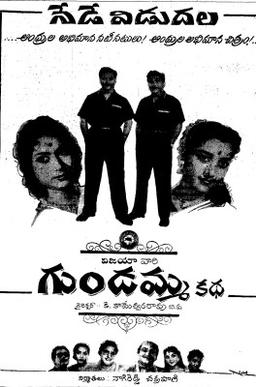
Gundamma Katha is a 1962 Indian Telugu-language comedy drama film directed by Kamalakara Kameswara Rao and co-produced by Nagi Reddi and Chakrapani under their banner Vijaya Productions. It stars N. T. Rama Rao, Akkineni Nageswara Rao, Savitri, and Jamuna, with S. V. Ranga Rao, Suryakantham, and Ramana Reddy in supporting roles.

Tenali Ramakrishna is a 1956 Indian Telugu-language political drama film produced and directed by B. S. Ranga based on Ch. Venkataramaiah's stage play of the same name. Produced for the banner Vikram Productions, it stars Akkineni Nageswara Rao, N. T. Rama Rao, V. Nagayya, Bhanumathi Ramakrishna, and Jamuna in key roles. Ranga handled the cinematography with his brother-in-law B. N. Haridas while P. G. Mohan edited the film. Viswanathan–Ramamoorthy composed the soundtrack and background score.

Pedda Manushulu is a 1954 Indian Telugu-language drama film produced and directed by K. V. Reddy. It stars Jandhyala Gaurinatha Sastry, Mudigonda Lingamurthy, Relangi, Vangara, Sriranjani Jr. in prominent roles. The film portrays corruption among so called respectable persons of the society. It was loosely based on The Pillars of Society, a 1877 play by famous Norwegian playwright Henrik Ibsen.
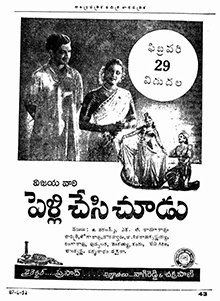
Pelli Chesi Choodu is a 1952 Indian satirical comedy film directed by L. V. Prasad and produced by Nagi Reddi and Chakrapani under their company Vijaya Productions. The film was made simultaneously in Telugu and Tamil, the latter titled Kalyanam Panni Paar. It stars N. T. Rama Rao, G. Varalakshmi, Yandamuri Joga Rao and Savitri. S. V. Ranga Rao, Sivarama Krishnayya, Doraswamy, and Suryakantham play supporting roles in the Telugu version while C. V. V. Panthulu replaced Krishnayya in Tamil.
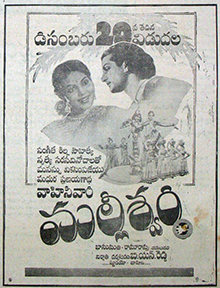
Malliswari is a 1951 Indian Telugu-language historical romance film produced and directed by B. N. Reddi under his banner Vauhini Studios. P. Bhanumathi and N. T. Rama Rao star as a couple – Nagaraju and Malliswari – who are separated by Malliswari's greedy mother. Malliswari is sent to the king's palace according to the custom of "Rani Vasam", a tradition during the Vijayanagara Empire wherein young women were fetched to the palace with an offering of gold and jewellery to their parents. The rest of the film focuses on the consequences faced by Nagaraju when he, against all rules, surreptitiously enters the palace to meet Malliswari.

Yogi Vemana is a 1947 Telugu-language biographical film produced and directed by K. V. Reddy. The story is based on the life of saint poet Vemana. V. Nagayya played the role of Vemana and also composed music and sang many poems and songs in this film exposing his multifaceted talents.
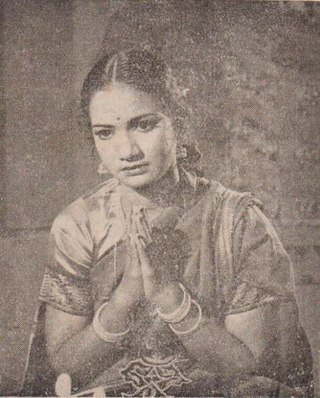
Raavu Balasaraswathi Devi is an Indian singer and actress who performed from 1930 to the 1960s in Telugu and Tamil cinema. She was the first light music singer on All India Radio and the first playback singer in the Telugu cinema.
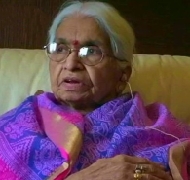
K. Rani was an Indian playback singer who has sung songs in Telugu, Tamil, Kannada, Malayalam, Sinhalese, Hindi, Bengali and Uzbek. Rani was the first female singer from India to sing in Sinhalese and Uzbek, and sang the national anthem of Sri Lanka.

Missamma is the soundtrack of the 1955 Indian Telugu-language film of the same name directed by L. V. Prasad. Composed by S. Rajeswara Rao, the soundtrack contains 11 songs with lyrics by Pingali. The film was written by Chakrapani, who co-produced it with B. Nagi Reddi for Vijaya Productions. N. T. Rama Rao and Savitri played the lead roles the Telugu version, with Akkineni Nageswara Rao, Jamuna, S. V. Ranga Rao, Rushyendramani, Relangi and Ramana Reddy in supporting roles.

Missiamma is a 1955 Indian Tamil-language romantic comedy film directed by L. V. Prasad. Produced by B. Nagi Reddy and Aluri Chakrapani's Vijaya Vauhini Studios, the script was adapted by Chakrapani from the Bengali novel Manmoyee Girls School by Rabindranath Maitra. Missiamma also focused on social issues such as unemployment, corruption, and freedom of worship. Missiamma tells the story of two unemployed people of different religions and mentalities: Balu and Mary. They pose as a married couple to obtain jobs in a high school founded by Gopal, the zamindar of Aandipettai. As Balu and Mary fall in love, Gopal's nephew Raju learns that Mary is Gopal's missing elder daughter Mahalakshmi; she is unaware of her true identity.

Stree Janma is a 1967 Telugu-language drama film, produced by D. Ramanaidu under the Suresh Productions banner and directed by K. S. Prakash Rao. It stars N. T. Rama Rao and Krishna Kumari, with music composed by Ghantasala.

Enga Veettu Penn is a 1965 Indian Tamil-language drama film directed by Tapi Chanakya and produced by Nagi Reddi and Chakrapani of Vijaya Combines Productions. A remake of the company's own Telugu film Shavukaru (1950), it features an ensemble cast that consists of M. R. Radha, S. V. Subbaiah, A. V. M. Rajan, Jaishankar, K. A. Thangavelu, Nagesh, V. Nagayya, O. A. K. Thevar and Nirmala, who became known as Vijaya Nirmala after its release. The film was released on 23 October 1965.
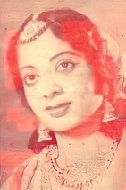
B. Jayamma was an Indian actress and singer. She began her career on stage as a 14-year-old when she joined a theatre group owned by Gubbi Veeranna, her future husband. She went on to perform for 45 years on stage while also appearing in 45 Kannada, Telugu and Tamil films.















